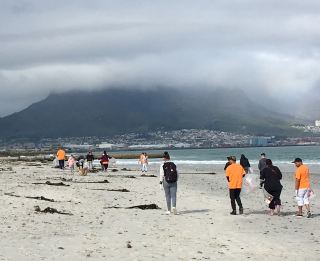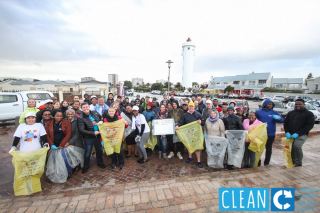THOUSANDS OF SOUTH AFRICANS ROLL UP THEIR SLEEVES FOR WORLD CLEAN-UP DAY 2018
Thousands of South Africans rolled up their sleeves, put on their rubber gloves and took to the beaches on Saturday, 15 September 2018 as part of the first World Clean-up Day - the largest peacetime civic action in human history.
Stretching across 24 different time zones, involving 144 countries and more than 13 million volunteers worldwide, World Clean-up Day started in Fiji and moved around the globe with the time zones, ending in American Samoa 24 hours later. In South Africa, 26 thousand registered volunteers and many more unregistered citizens arrived at beaches between 09:00 and 12:00 to do their bit to pick up and remove litter from our marine environment.
South Africans unite for a clean environment
Plastics|SA and sponsors partnered with Let’s Do It! Africa and Ocean Conservancy by coordinating South Africa’s involvement in this year’s clean-up, and provided resources in the form of 300 000 specially printed yellow refuse bags, latex gloves and ground support to make this one of the biggest events ever to take place in South Africa as part of the annual Clean-up and Recycle SA Week.
According to John Kieser, Sustainability Manager at Plastics|SA and coordinator of the beach clean-ups that took place in KwaZulu Natal, Southern, Eastern and Northern Cape, the annual event has grown tremendously since the first time South Africa took part in the International Coastal Clean-up Day 22 years ago.
“The public awareness about the damage litter causes to the marine environment and a willingness to do something about it, has reached an all-time high. Regardless of their age, gender, race or economic position, South Africans realise that even the smallest effort makes a big difference in the end. Saturday saw one of the biggest turn-outs of volunteers we had ever seen as people from all walks of life put their differences aside and worked shoulder to shoulder for a great cause,” Kieser said, thanking all the volunteers and the various sponsors who participated and helped to make the event a huge success.
Keeping South Africa’s coastline clean
More than 110 official clean-up events took place around South Africa’s coastline that stretches for more than 2 500km along two oceans, although many more unregistered, community driven spontaneous events took place throughout the week and on the day.
Highlights of the 2018 event in South Africa include:
Hosting three of the largest off-shore island clean-ups that took place on Robben Island, Dassen Island and Bird Island.
Growing clean-ups on the Wild Coast from seven in 2017 to forty-two this year.
Initiating beach clean-ups in ecologically sensitive areas and areas with no area cleansing services
Contending with Mother Nature
Although it was slightly rainy in Cape Town, the volunteers were still very motivated to keep up their fantastic work and respond to the call to help create a waste-free world.
“Unfortunately some of our clean-ups had to be cancelled or postponed due to rough sea conditions, but it was nothing as severe as the three active tropical cyclones that affected 11 of the participating countries. According to global disaster alerts, the Philippines, Hong Kong, Taiwan, South Korea, Macau, several US States and the Dominican Republic were all significantly impacted due to the strength and paths of the storms, posing a threat to millions of people. Once conditions are safe again, with damage assessments complete, these countries and territories who had to postpone their events will resume their commitment to their clean-up plans, with hundreds of thousands of people likely to swell the numbers recorded,” Kieser says.
The biggest litter bugs
In order to get a detailed snapshot of the biggest pollutants on the country’s beaches, the Plastics|SA team will again be spending the next month analysing the data sheets that were filled in by volunteers at the audited clean-ups. Despite extensive education and awareness campaigns that have taken place in South Africa over the past few years, Kieser remarked that the volunteers were all shocked to see the amount of litter strewn on beaches and between rocks. The most prevalent items collected each year are earbud and sucker sticks, straws, sweet wrappers and cigarette butts.
Effective waste management to follow up civic action
“The purity of our oceans is a crucial issue for our country. However, it is important to remember that clean-ups do not offer a long-term solution and are not meant to replace regular waste management. With events such as this past weekend’s World Clean-up Day, the aim is to draw attention to littering, trash blindness and general mismanagement of waste. Civic action must be followed up by effective waste management reforms. Improved waste collection and management must be established everywhere. We also need to look at what we are throwing away, because nothing is waste until it’s wasted. Plastics and other packaging material should not end up in landfills and definitely not in our oceans, because they are valuable resources should be recycled,” Kieser concluded.
For more information, visit www.clean-upandrecycle.co.za or www.plasticsinfo.co.za
-- ENDS --
Notes to the editor:
Inputs were received from www.worldcleanupday.org.za
The exact number of volunteers who participated and clean-ups that took place in South Africa will be made available later this year when data sheets about this past weekend’s beach clean-up have been audited.
WORLD CLEANUP DAY 2018
Plastics|SA is proud to be partnering with Let’s Do It! Africa in the first ever World Cleanup Day that will be taking place on Saturday, 15 September 2018, by providing resources towards the biggest, global cleanup event that the world has ever witnessed.
On this day, more than 150 countries around the world will be mobilized to pick up litter. World Cleanup Day will start in New Zealand when the sun rises, and moving around the globe with the time zones until it sets, end in Hawaii 36 hours later. South Africa is proud to be one of the 60 countries from the African continent who will be participating in this year’s event!
Background
It is estimated that each year, 8 million tonnes of litter end up in the environment - causing a serious threat to people, wildlife, soil, water and air. The World Cleanup Day is a call to action for the public, decision makers and all citizens alike, to take real action in solving the waste problem.
For the past 22 years, Plastics|SA has been partnering with Ocean Conservancy by coordinating South Africa’s involvement in the annual International Coastal Cleanup Day. This annual event takes place on the third Saturday in September and sees thousands of volunteers each year collecting and removing litter from our waterways as part of Cleanup & Recycle SA week. This year, the week will take place from 10-15 September 2018 - culminating in the first World Cleanup Day on Saturday, 15 September 2018.
“This is the biggest positive civic action the world has seen, and we are fortunate to be part of this global movement that hopes to inspire change in human behaviour,” says Douw Steyn, Sustainability Director of Plastics|SA.
Plastics|SA’s commitment to reducing packaging waste
Packaging waste continues to be one of the biggest culprits when it comes to pollution of our water sources and marine environment. However, as one of the first signatories of the Marine Debris Declaration, whereby 74 plastics associations from around the world have committed themselves to fight marine litter in 2011, Plastics|SA actively supports projects in six key areas aimed at contributing to sustainable solutions, namely education, research, public policy, sharing best practices, plastics recycling/recovery, and plastic pellet containment.
“We have managed to get other packaging streams and retailers to support our efforts and recycling initiatives, such as our beach clean-ups, Operation Clean Sweep, sponsoring litter booms and the Aqua Amazing schools’ education programme. Last year alone, we donated 350 000 yellow refuse bags that were used for clean-ups around the country and assisted coordinators with audited clean-ups,” he says.
Approximately 80% of ocean litter is derived from land based waste. Without effective waste collection, an avalanche of debris will enter the ocean. To prevent this, Plastics|SA is not only encouraging South Africans of all ages, races and backgrounds to participate in this year’s Cleanup and Recycle SA week activities and World Cleanup Day, but also to be responsible in their daily activities by ensuring their recyclables are collected for recycling as we all continue to work towards a common goal: creating a cleaner world.
Launching World Cleanup Day in South Africa
South Africa’s participation in the World Cleanup Day was launched at a beach cleanup that took place at Milnerton’s Woodbridge Island in Cape Town last week. Attending the event was Erik Solheim, United Nations Environment Executive Director, who joined Clean C, the Department of Environmental Affairs, Let’s Do It Africa team, Plastics|SA and other organisations. Solheim said it was very encouraging to see the enthusiasm and the efforts by locals to protect the ocean and keep the beaches clean.
“South Africa is doing great and it is fantastic to see so many people being mobilized. Your country has some of the most beautiful beaches in the world and has a very long coastline. However, more needs to be done. We see the problem of litter on the beaches and marine environment all over the world. The good news is humans created this problem, but we can definitely solve it too. We need to clean the beaches and keep them beautiful, but we also need to stop the garbage coming from the source,” Solheim encouraged.
For more information, visit http://cleanupandrecycle.co.za/ or www.letsdoitworld.org



